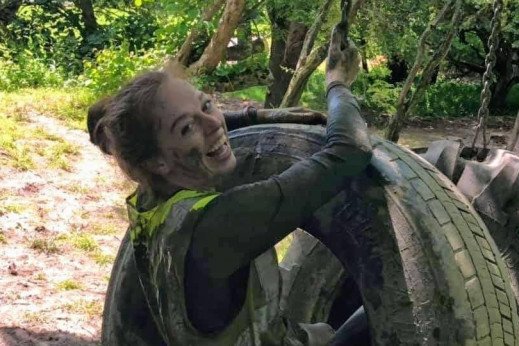It was July 2011 and I was just about to give my first doctoral presentation at a National conference. To the outside world I appeared happy, confident and full of life. The reality, however, was markedly different, and in less than 24 hours I was diagnosed with anorexia nervosa.
It was a tutor who first noticed there was something really wrong. Following a meeting in early 2011, she asked if I was okay citing that she had noticed I was losing weight, looking gaunt and becoming distant. At the time, she suggested that I should pop into the next eating disorder drop-in clinic at the University – a monthly service that was run by the local eating disorder service in the area. I insisted I was fine and said I would work harder to look after myself. As the weeks passed, those around me were getting more concerned about me. In the end I visited the drop-in clinic where it was made clear to me that I needed to visit my GP with some urgency. I tried to convince myself and others I was fine, but they didn’t buy it. Five weeks later, I summoned the courage to see my GP, who made a referral to my local NHS eating disorder service.
Within four weeks of seeing my GP I was sitting in front of two eating disorder nurse specialists, who confirmed a diagnosis of anorexia. I was offered a weekly outpatient appointment for six weeks. In these sessions, I would often say I was fine, gain ‘false’ weight before appointments and then continue to self-destruct between appointments. I realise now I was in denial. My mind convinced me everything was fine, even when things were anything but. I had a justification for everything. I would tell myself I wasn’t actively trying to lose weight, rather I was just “too busy” to eat. I wasn’t over attending gym classes to lose weight, rather these were my downtime from my PhD. Ultimately, my eating disorder had taken over my life and was controlling me, and yet I still thought I was the one in control.
Following these sessions, my support was ‘suspended’ whilst my case was reviewed by the eating disorder team. Eventually, I was offered an assessment with the services consultant psychiatrist. This appointment, however, was a number of weeks away. All the while, I was further deteriorating both physically and emotionally and I was now engaging in bulimic as well anorexic behaviours. My studies were also suffering and for the first time I began to realise that this illness could cost me my desire and dream of gaining a doctorate.
By the time of my assessment I was a shell of my former self. Deep inside I knew I wasn’t okay, but I didn’t feel worthy of help and had convinced myself that I wasn’t worth spending NHS resources on. The specialist I saw disagreed, and what followed helped save my life. Nine months after my diagnosis, I was lucky enough to be offered local regular intensive outpatient sessions with the services consultant psychiatrist. Instantly, I connected with her – she understood me and she cared. In return I felt I could be open and honest with her. The months that followed were tough but I always felt supported by my specialist. Slowly but surely, I regained the weight I had lost and, my tutor remarked, “started to get my sparkle back”. I was even starting to believe myself that recovery was possible, although I always questioned if I was good enough to achieve it. After a year of intensive therapy my appointments were reduced and became much more focused on me and my feelings – after all, my eating disorder was a coping mechanism, a way of me dealing with how I feeling about myself.
By January 2015 I had achieved my PhD and managed to secure my dream job as a Research Fellow. Everything was going well, but recovery isn’t a straight line and following a family bereavement I found myself drifting backwards. Under the guidance of my specialist, my appointments were increased until a time when we both felt they should be reduced again. For me this incremental approach of decreasing appointments was a lifeline. It enabled me to consolidate my progress and start living a social life in the knowledge that someone was there to catch me if I fell.
I was discharged in December 2016, and although I still see my GP for support, I can confidently say I am in a good place and whilst, like everyone, I have my down days, these are now manageable.
I have often been asked what caused my eating disorder. This remains a question I’m not sure I will ever be able to confidently answer. What I do know is the months leading up to my diagnosis were a hectic time and I felt out of control. I have always been a perfectionist and have always harboured the thought I could do better. I would push myself harder and harder at everything I did, but in 2011 I simply couldn’t sustain the pressure I was piling on myself. I started to feel out of control and food and weight became my way of dealing with it.
Today, as I reflect on the impact of my eating disorder on those closest to me, I can see the heartache it caused. On many occasions, family would make comments like “what’s the matter with you … just eat”; “you’re ruining everything with your fad…”. At the same time, my tutors were more receptive, encouraging me to talk about how I was feeling. I longed for my family to react in the same way, and until now I didn’t feel I could openly talk about this side of my illness as I didn’t want anyone to think ‘bad’ of my family – it certainly wasn’t their fault I developed an eating disorder. For a long time, I felt alone; then I came across an article in which the journalist Mark Austin wrote about “how it feels to .... have an anorexic daughter”. As I read the article I began to cry. I could resonate with so much of what was written and for the first time I realised I wasn’t alone. The reactions of my family mirrored the experiences of others. For me, reading the article helped me to understand how and why those closest to me reacted as they did.
I consider myself extremely lucky to have been able to access the treatment I did. I was in the right place at the right time, and I was fortunate that the University I was at ran a monthly drop-in clinic manned by specialists. But accessing help and treatment shouldn’t be a matter of luck and it shouldn’t matter where you live.
It’s fair to say this is one of hardest things I have ever written, a deeply personal reflection that I never imagined sharing. My hope is that people may read my story, see what can be achieved with the right help, and reinforce the message that now is the time for action when it comes to increasing mental health resources.
Contributed by Claire
What happens when you start to feed your brain again?
5 May 2021You have to learn how to live again and, like with any lessons, you often have to fail to learn the best way or the right way...
"Things can improve, even when it feels hopeless"
29 April 2021In the past I’ve wanted to hide the eating disorders that are part of my history, but I want to shout from the rooftops: I'm proud of how far I had come!
"This year has taught me to be kinder to myself"
21 December 2020What a year 2020 has been in general for everyone – it was a year no one ever could have imagined, from panic buying, toilet roll shortages, lockdowns and restrictions. Yet for so many, including me, the battle against an eating disorder continued.


